
Related
Topics
President Bush is coming under increasing criticism for his slow response to what is now being described as one of the worst natural disasters in the country’s history. We play some of the president’s remarks as well as excerpts from a White House news conference. [Includes rush transcript]
President Bush is coming under increasing criticism for his slow response to what is now being described as one of the worst natural disasters in the country’s history.
On Monday, as Hurricane Katrina surged ashore just east of New Orleans, Bush traveled to Arizona and California, pitching a new Medicare prescription drug benefit.
On Tuesday he went to San Diego where he was photographed playing a guitar before returning to his estate in Crawford.
On Wednesday, as Bush returned to Washington, Air Force One flew over the Gulf Coast region so the president could see the magnitude of the devastation from the air. He went on to give a televised address in what a New York Times editorial called, “one of the worst speeches of his life.”
On Thursday, Bush again addressed the nation with former Presidents Bill Clinton and George HW Bush by his side.
- President Bush, news conference, September 1, 2005.
This recovery is going to be a long process. It’s going to take a lot of hard work and patience and resolve. It’s also going to require a lot of money. And the federal government will do its part. But the private sector needs to do its part, as well. And that’s why I’ve asked Presidents Bush and Clinton to lead a nationwide fundraising effort to help the victims of Hurricane Katrina. In the days ahead, the former Presidents will ask Americans to open their hearts and their wallets to help those in need. And they’re going to talk to large corporations and small businesses and individual citizens across the nation. The contributions will benefit the relief organizations that are doing vital work on the ground. We’re going to take a look and make sure that the money raised is money needed.
The White House has been scrambling to defend itself against criticism that it has consistently proposed cutting the budget for Army Corps of Engineers water and flood control projects.
In February, President Bush proposed cutting the Corps” budget by 7 percent. The year before, Bush proposed a 13 percent cut.
Pentagon officials today said an additional 4,200 National Guard troops would be deployed over three days and that 3,000 regular Army soldiers may also be sent in to disaster areas.
According to some estimates, there are 11,000 National Guard personnel from Louisiana, of whom about 3,000 are in Iraq. President Bush has come under criticism for stretching thin the National Guard. On Thursday longtime White House correspondent Helen Thomas questioned White House Press Secretary Scott McClellan about the issue.
- Scott McClellan, White House news conference, September 1, 2005.
Transcript
REPORTER: Are you going to bring back any National Guardsmen from Iraq to help?
SCOTT MCCLELLAN: I think that the military talked about that a little bit yesterday. I think you’re talking about two separate priorities and we’re addressing both. And they’ll be talking later today, I think, about some of the ongoing increase in the number of National Guard units that are being deployed to the New Orleans area to meet the security and law enforcement needs that are on the ground. I think that they’ve indicated that, yes.
AMY GOODMAN: Scott McClellan. He was also asked about a number of issues. This is White House Press Secretary, Scott McClellan.
REPORTER: There’s already a line of discussion going on about the funding of projects prior to this, whether projects in New Orleans, in particular, were under funded because of the Iraq war or for other reasons. Is there a — do you find any of this criticism legitimate? Do you think there is any second-guessing to be done now about priorities, given that the New Orleans situation was sort of obvious to a lot of the experts?
SCOTT MCCLELLAN: As I indicated, this is not a time for politics. This is a time for the nation to come together and help those in the Gulf Coast region. And that’s where our focus is. This is not a time for finger-pointing or playing politics. And I think the last thing that the people who have been displaced or the people who have been affected need is people seeking partisan gain in Washington. And so if that’s what you’re talking about, that’s one thing. Now, if you’re talking about specific areas, if you’re talking about specific areas, I think I would be glad to talk about some of those, if that’s what you want. I don’t know what specific areas you’re —
REPORTER: I’m talking about policy. I’m talking about the SELA project, for instance, is one some people cite where they felt they needed $60 million in the current ’06 fiscal year, they were given $10 million, those types of projects. And a lot of —
SCOTT MCCLELLAN: I’m sorry, which project —
REPORTER: SELA —- Southeast Louisiana flood control -—
SCOTT MCCLELLAN: Flood control has been a priority of this administration from day one. We have dedicated an additional $300 million over the last few years for flood control in New Orleans and the surrounding area. And if you look at the overall funding levels for the Army Corps of Engineers, they have been slightly above $4.5 billion that has been signed by the President.
REPORTER: Local people were asking for more money over the last couple of years. They were quoted in local papers in 2003 and 2004, are saying that they were told by federal officials there wasn’t enough money because it was going to Iraq expenditures.
SCOTT MCCLELLAN: You might want to talk to General Strock, who is the commander of the Army Corps of Engineers, because I think he’s talked to some reporters already and talked about some of these issues. I think some people maybe have tried to make a suggestion or imply that certain funding would have prevented the flooding from happening, and he has essentially said there’s been nothing to suggest that whatsoever, and it’s been more of a design issue with the levees.
AMY GOODMAN: The white house announced it would have zero tolerance for looter, even for those taking essential items needed to stay alive. Scott mcclellan was pressed on the issue at yesterday’s white house press briefing.
REPORTER: Scott, do you cited the President’s zero tolerance for insurance fraud, looting, price gouging. Does he make any allowance for people who have yet to receive aid who are taking things like water or food or shoes to walk among the debris?
SCOTT MCCLELLAN: I think you heard from the President earlier today about his zero tolerance. We understand the need for food and water and supplies of that nature. That’s why we have a massive effort underway to continue getting food and water and ice to those who are in need. There are ways for them to get that help. Looting is not the way for them to do it.
AMY GOODMAN: White house press secretary, Scott McClellan.

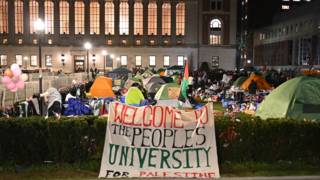
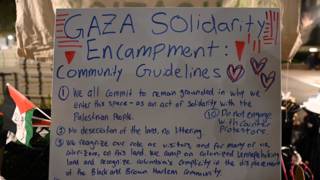
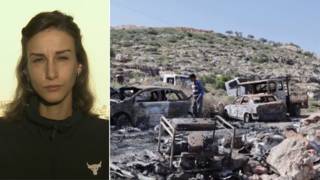
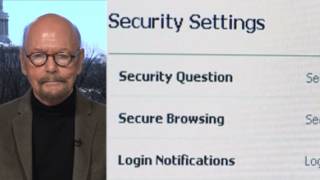





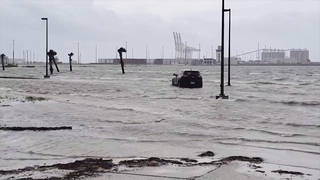

Media Options